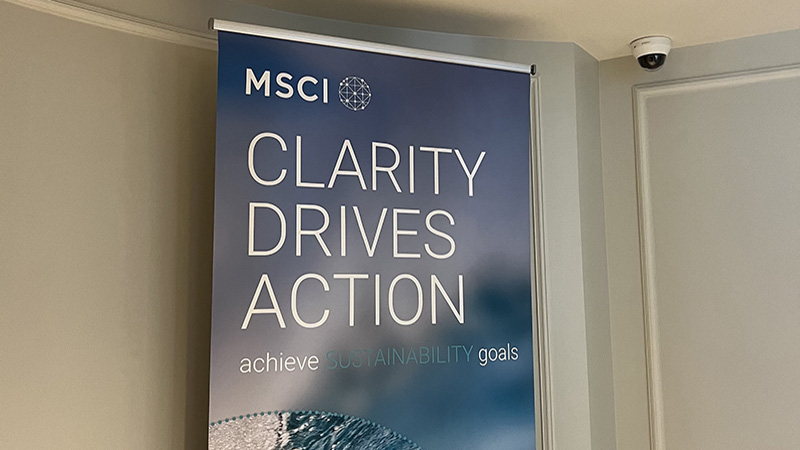All investors must recognise that climate-related risks are financial risks and that “not acting on climate change is going to cost us more than not acting”, Dr Rhian-Mari Thomas, chief executive of Green Finance Institute, said in an introductory interview at MSCI’s Capital for Climate Action EMEA Conference.
Capitalising on the green transition was a dominant theme throughout the conference as conversations centred on how to transition to a net-zero portfolio within private equity, alongside how the Artificial Intelligence (AI) revolution helps investors understand climate change in the financial sector.
First, the interview with Dr Thomas – A greener future made possible by finance – was carried out by Ashley Lester, chief research officer at MSCI, and addressed the role of finance in securing a green economy and why the financial markets are best placed to serve end investors and the planet.
Dr Thomas said: “We must ensure the opportunities for sustainable investment are as attractive as the opportunities to make money from investments in other sectors. The financial sector is no different than any other industry. We have become efficient so that capital is deployed towards business models for millions of clients in many sectors.
“However, we must recognise that climate, and increasingly, the degradation of nature, is impacting the nature of the economy. We must carry out our due diligence and be aware that financial decision making has an impact on the environment. Not acting is going to cost us an awful lot more than acting.”
The role of private capital
The panel – Private Capital’s pivotal place in the climate transition – moderated by Meggin Eastman, head of sustainable finance research at MSCI, addressed the role of private capital allocations within the low-carbon transition.
The panelists were:
- Franck Rizzoli, managing director, head of ESG financing advisory at BNP Paribas
- Vikram Raju, managing director head of climate investing at Morgan Stanley
- Michael Viehs, global head of sustainable investing at Partners Capital
- Abdulla Zaid, vice president private capital research at MSCI
While Rizzoli stressed the importance of the transparent data when making portfolio allocations, the main message was firms must be clear when asking companies questions about its transition plans.
For example, Eastman asked Viehs about how Partners Capital united the intersection between climate goals and the financial performance of investments. He said: “When you are investing in the winners of tomorrow, we are investing in the fund and the fund manager. The private equity investor identifies companies that will deliver irrespective of whether there is a dimension of products and services. It is about identifying companies that can deliver the expected returns.”
Viehs added managing client expectations played a role when attempting to align climate goals and financial returns.
He said: “Asset owners have different risk return profiles, some of which want to invest more in private equity climate solutions. Setting up a diversified portfolio across different asset classes is the goal. Many of our clients are interested in contributing to the low-carbon and creating a net-zero portfolios.
“However, it is not always about reducing investments in high emitting companies in the portfolio. The portfolio manager may identify these companies that are have credible transition plans and will reduce their carbon emissions over time. Looking for companies that have goals to reduce overall carbon emissions is crucial,” Veihs concluded.
Take advantage of Artificial Intelligence
Another panel, titled Separating hope from hype in AI for climate finance and investment, was moderated by Oliver Marchand, global head of climate research at MSCI.
Marchand introduced the event by asking ChatGPT to introduce the two panelists, Dr Markus Leippold, professor of financial engineering at the University of Zurich, and Budha Bhattacharya, head of systematic research at Lombard Odier Investment Managers.
The panel discussed how investors are leveraging AI to develop to deepen climate insights and take their strategies accordingly, alongside the limitations of AI and the ‘hype’ associated with the new technology.
Bhattacharya spoke about how AI is being used to make financial decisions and the technological tools Lombard Odier Investment Managers are experimenting with at the moment.
He said: “We see a lot of use cases both internally and externally. The main benefit is internal efficiency. For example, when it comes to taking notes in meetings with clients, writing emails, tasks where we have to report on multiple data sources, using large data sets, writing newsletters, undertaking marketing research, client research or thinking about customer relations, Artificial Intelligence speeds up these internal processes.
“Currently, we are playing with machine learning and signal regeneration from our data extraction from dark databases. This includes dark variables such as legal documents and regulations. In order to go into a sovereign market, for example, we must look at what their policies are, the regulations, climate-related moves. Artificial Intelligence will help us gain these answers quicker,” he concluded.
Marchand also invited the audience to answer the question: What is the biggest challenge in integrating AI into climate-related financial decisions? The most common answers were reliability, data quality and trust.
Similarly, MSCI has recently launched MSCI AI portfolio of insights which, according to MSCI’s Lester, “represents the latest step in our mission to inform investors holistically about the risks that they are taking”.
He continued: “AI is the biggest change to the combination of risk and portfolio management that we have seen in 20 years.”
This article was first seen in our sister publication, PA Future










